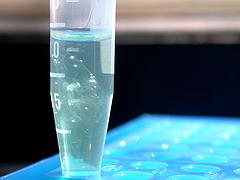Genetics Ruling Reclaims Human Genome For Humans

The Patent Act of 1952 is supposed to exclude "products of nature" from patentability, but it has historically been interpreted to allow identified and extracted DNA segments as included in "human made inventions," such as for recombinant DNA. After 1980, entire organisms were patentable, such as General Electric's patent on crude-oil cleaning bacteria.
In the Myriad Genetics case, the Court distinguished between sequences of "naturally occurring" DNA and cDNA, which is isolated from RNA that has previously been transcribed from DNA. The cDNA sequences are patentable because scientists must create them, and they are not naturally present in human cells. However, natural DNA is what contains the information that tests are meant to read in the first place, so the determination of BRCA genes' link to breast cancer counts as general scientific knowledge rather than human invention.
In an age when sequencing an entire genome is routine, and only costs about $5,000 (compared to $3,400 to tests two genes for BRCA), these technical details are increasingly accessible - or they should be. But before the ruling, patients had to pay one company through the nose to determine, whether or not to get a mastectomy or pursue some other kind of treatment. Cancer researchers have identified the patents' chilling effect on further BRCA research from a lack of access to Myriad Genetics' data.
It is important to consider that genetic testing will probably remain inaccessible to many patients because of lack of insurance coverage, but the ruling does provide incentives to other genetics testing companies to enter the BRCA market and decrease Myriad Genetics' monopoly power. Rebecca Nagy, president of the National Society of Genetic Counselors, has said that "where the costs of most genetic tests have fallen in recent years… this test increased in cost.”
Gail Jarvik, head of the University of Washington Division of Medical Genetics, said that when doctors found genetic abnormalities in a patient on the patented BRCA gneiss, they would have to redundantly re-test the gene through a Myriad-affiliated company before using the results, which made the process more expensive.
Myriad Genetics has broad cost implications for researchers on all types of genetic sequences and for the patients who stand to benefit from knowing their own genetics in the future. This ruling is therefore an important step away from a worrying legal trend towards privatized, for-profit scientific research. While patents can preserve the incentive to create new technologies in some fields, medicine should prioritize the wellbeing of all patients. Policymakers and the courts should make it easy for multiple public and private researchers to work with the human genome that everybody has.



